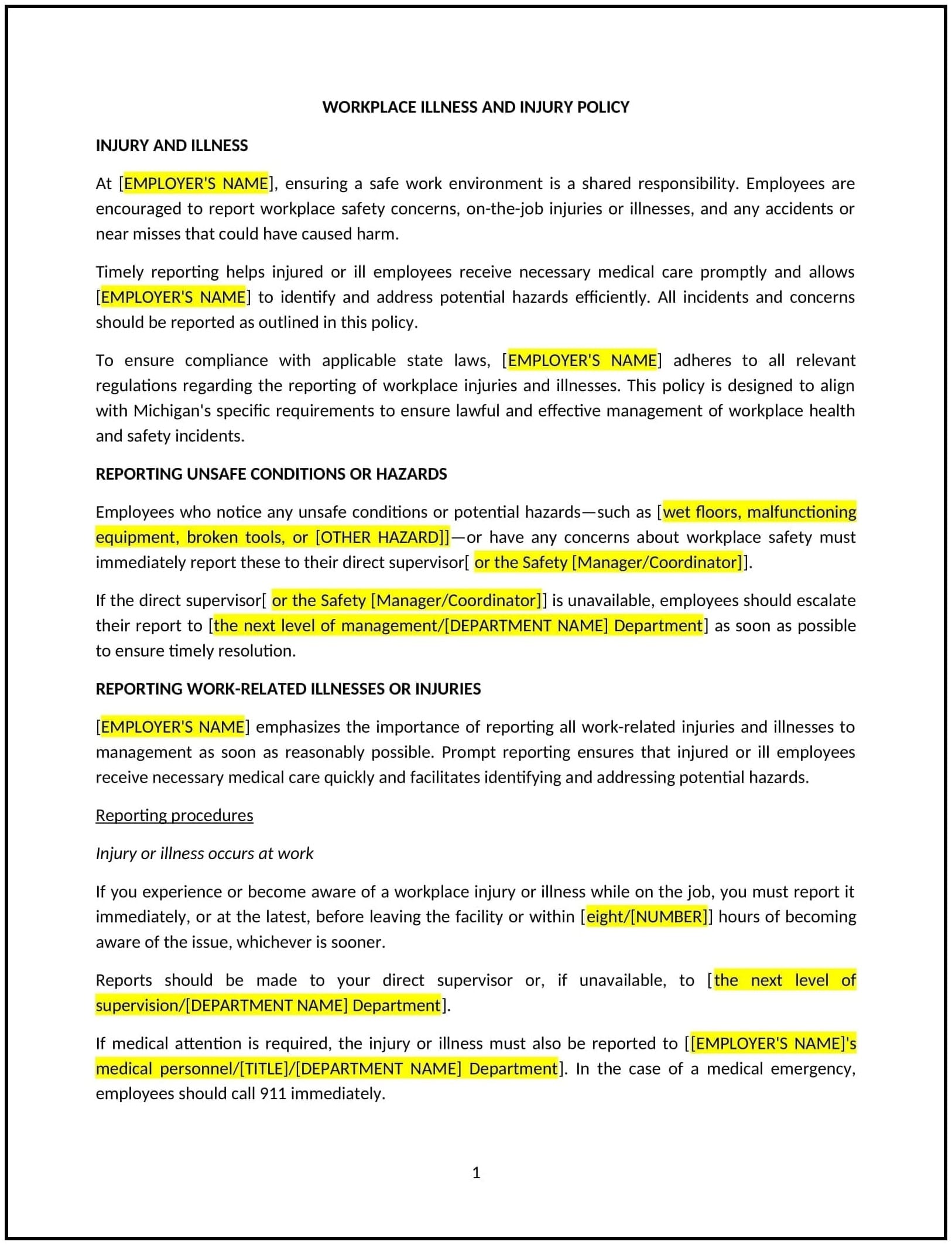Workplace illness and injury policy (Michigan): Free template
Got contracts to review? While you're here for policies, let Cobrief make contract review effortless—start your free review now.

Customize this template for free
Workplace illness and injury policy (Michigan)
A workplace illness and injury policy provides Michigan businesses with guidelines for handling employee illnesses and injuries that occur on the job. This policy outlines the process for reporting injuries or illnesses, the steps to ensure employees receive proper care, and the procedures for returning to work after an illness or injury. It also includes provisions for workers' compensation, safety protocols, and the employer's responsibilities in maintaining a safe and healthy work environment.
By implementing this policy, businesses can ensure that employees' health and well-being are prioritized, minimize the risk of workplace injuries, and support compliance with Michigan state laws regarding workplace safety and workers' compensation.
How to use this workplace illness and injury policy (Michigan)
- Define what constitutes a workplace injury or illness: Clearly outline the types of injuries or illnesses that fall under this policy, including both physical injuries and illnesses caused or aggravated by work-related conditions.
- Establish the reporting process: Specify the steps employees should follow to report injuries or illnesses, including who to contact, how soon they need to report the incident, and the information required (e.g., accident reports, medical documentation).
- Set timelines for reporting: Outline the timelines for employees to report workplace illnesses or injuries, and explain the consequences of failing to report incidents within the required time frame.
- Provide for medical care and treatment: Specify how employees should seek medical care, including whether the business has specific medical providers they should visit, or if employees can choose their own healthcare provider. Include guidance on how medical expenses are handled, especially in relation to workers' compensation claims.
- Address workers' compensation: The policy should detail how employees will file for workers' compensation benefits and the process for managing claims. It should also include information on how medical bills and lost wages are covered under workers' compensation.
- Define the return-to-work process: Outline the steps employees need to take when returning to work after an illness or injury, including whether a fitness-for-duty examination or medical clearance is required before they return.
- Prevent further incidents: Include a section on workplace safety, outlining procedures for preventing injuries or illnesses, such as regular safety training, proper equipment usage, and workplace ergonomics.
- Ensure compliance with Michigan state laws: The policy should comply with Michigan’s Occupational Safety and Health Administration (MIOSHA) regulations, workers' compensation laws, and any other state laws relevant to workplace illness and injury management.
- Review and update regularly: Periodically review and update the policy to ensure it aligns with any changes in Michigan state laws, industry standards, and the business’s approach to workplace safety and health.
Benefits of using this workplace illness and injury policy (Michigan)
This policy provides several key benefits for Michigan businesses:
- Promotes employee health and safety: By prioritizing employee well-being and setting clear procedures for handling illnesses and injuries, businesses can foster a safer work environment and reduce the risk of workplace accidents.
- Supports workers’ compensation claims: A clear and structured policy for handling injuries and illnesses helps ensure that workers' compensation claims are processed efficiently, ensuring that employees receive the benefits they are entitled to.
- Ensures legal compliance: By adhering to Michigan’s workers' compensation laws, Occupational Safety and Health Administration (MIOSHA) regulations, and other applicable state laws, businesses can avoid potential fines, penalties, or legal disputes.
- Reduces workplace disruptions: By providing clear guidelines for reporting and managing injuries, businesses can minimize disruptions caused by illness and injury and ensure that employees can return to work as soon as they are able.
- Protects the business’s reputation: A well-handled illness and injury policy demonstrates the business’s commitment to employee safety and well-being, improving employee morale and the company’s public image.
- Enhances productivity: By addressing and resolving workplace injuries or illnesses quickly, businesses help employees recover faster and reduce the time they spend away from work, contributing to increased productivity.
Tips for using this workplace illness and injury policy (Michigan)
- Communicate the policy clearly: Ensure all employees understand the policy by including it in the employee handbook, during onboarding, and in regular training sessions about workplace safety and health.
- Encourage timely reporting: Make sure employees know the importance of reporting any injuries or illnesses immediately, so that they can receive the necessary medical attention and compensation in a timely manner.
- Provide access to necessary resources: Ensure that employees have easy access to medical resources, safety equipment, and any information they need to prevent workplace illnesses or injuries.
- Monitor workplace safety: Regularly assess the workplace for potential hazards, conduct safety audits, and encourage employees to report any unsafe conditions. Addressing potential risks proactively can help prevent injuries before they occur.
- Support return-to-work employees: Establish a smooth and supportive process for employees returning to work after an illness or injury, including any necessary accommodations or adjustments to their duties, to help them reintegrate successfully.
- Review the policy regularly: Periodically review the policy to ensure it remains aligned with changes to Michigan state laws, company procedures, and best practices in workplace safety.